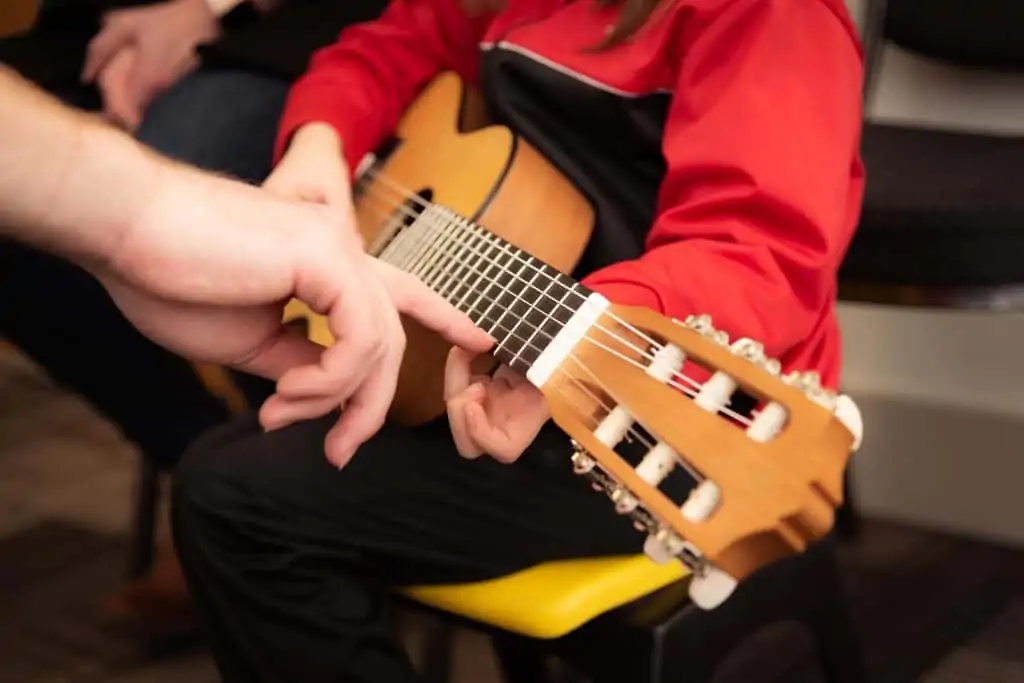How hard is it to learn guitar? This is a question that a lot of people ask. It can be daunting to learn a new instrument and you want to know if you have the time and energy to sink into the process. This is definitely a consideration when you need to buy a guitar and may have neighbors to consider.
Personally, I think, that if you really truly want to learn to play guitar, you shouldn’t let difficulty get in your way. Honestly, though, you’ll find that getting to the point where you can play some basic chords and do basic picking isn’t that hard for most people.
You just need to practice regularly, preferably every day. Many people can play easy songs decently within a few weeks.
It’s when you want to master the instrument that it starts to get tough. It can take a few years to become amazing, particularly if you are studying or have a job and other responsibilities that mean you can’t dedicate hours each day to practicing and playing guitar.
But going up in skill levels depends on how regularly and how well you practice, your anatomy (some hands and fingers struggle more than others), and how persistent you are.
Let’s take a more in-depth look at some things you’ll encounter during your journey and how to make them a little easier to deal with.
Contents
Is it Easier to Learn with a Teacher?

This is probably one of the first questions you have on your mind.
It largely depends on your learning style. If you’re a very self-motivated person, you can learn to play the guitar without formal lessons and it shouldn’t be too hard for most people who go that route. But if you benefit from a structured learning plan and prefer for someone to show you and you like to ask questions, you would do well with a teacher.
Having a teacher can make you learn better in terms of correcting bad habits and mistakes. Sometimes these issues can keep you back. For example, if you aren’t holding the guitar properly, playing the chords incorrectly, or you play with too much tension in your hands.
But at the same time, there is so much information out there in the form of websites like ours, videos on YouTube, and books. If you have the self-discipline to practice regularly and the motivation to upskill every time you master something, you will do fine on your own.
Sore Fingers and How Long It Takes for Calluses to Form
Before you build calluses, playing does hurt a little. If you play for too long in the beginning, they can hurt a lot. But even just 10 minutes a day will give you calluses and help you to maintain them. It takes about two weeks, although for some people it may take up to a month to really get those calluses hard.
My grandfather told me to put some methylated spirits on my fingers to harden the tips faster. I have no idea if it helped, it’s too long ago to remember. But don’t use glue or cover them in tape or plasters or something, which can build a nice protective layer. That will delay your calluses. Don’t worry, your calluses will form naturally on their own as long as you play regularly, and every day in the beginning.
More Tips for Sore Fingers and How to Build Calluses
- Lower the action on your guitar if it’s too high (as in the strings are very high off the fretboard). A lot of guitars, especially cheaper ones aren’t set up and can be harder to play.
- Get a lighter gauge of strings. Often cheaper guitars come with high gauge strings of poorer quality which can be hard to play as a beginner.
- Cut your nails. While it’s not impossible to play with long nails, not only is there a risk of damaging your fretboard (I should know), but it’s much harder to get the notes to ring clearly and for calluses to build. Plus, you may ruin your nails. This is just for your fretting hand. If you want to play fingerstyle, by all means, grow the nails on your other hand.
- Keep your first few practice sessions short, 10-20 minutes. Playing too long, especially as your fingers get used to working in this new way, can cause overuse injuries. And as I found out the first day I played guitar, playing for an hour to an hour and a half makes it almost impossible to play for the next day or two. It just hurts too much.
- Take a break. If you’ve played for too long during the first few days, especially, it won’t hurt to rest a day or two.
- Ease up on how hard you press the strings down. Playing with too much pressure can cause damage to your joints. Only press down as hard as you need to in order to produce a note. Similarly,
Sore Hands and How to Deal With Them
Yes, your hands can get sore too. In the beginning, this can be because of playing with too much tension. Either gripping the guitar, pushing the strings down too hard or gripping your pick for dear life. As you progress, it can be that your muscles are being used in a new way to play barre chords.
How to Combat Hand Pain
- Relax your hands before you play. Warm them up a little and do some light stretches with your fingers. Keep your hands flat on a surface and then lift your fingers one by one just enough to feel a little stretch. Shake them out. If you feel the tension creep back in during playing, just be conscious about relaxing your hands and shake them out again if need be.
- Go slowly with the barre chords once you start learning them. Even seasoned guitarists can experience tired or sore hands if they suddenly play a song with only barre chords if that isn’t what they usually do. So play some chords open and pick one or two to play as barre chords when playing songs. The muscles of your hands will build up strength and stamina as you play.
Developing Dexterity

This is something that can frustrate new guitarists, especially if they play above their skill level. The types of skills I’m referring to include:
- Being able to change chords quickly
- Playing notes in a sequence smoothly and timeously
- Being able to stretch across frets
- Playing notes that skip strings
- Using a plectrum to pick
- Plucking strings with your fingers
- Strumming
How to Develop Dexterity
Dexterity comes with practice. There is no shortcut here. You need to practice all these skills to become better at them.
- Do exercises regularly to hone your skills
- Give your pinky some practice too, your playing will improve a lot when you use your little finger too
- Practice strumming in all different kinds of ways, and remember to stay relaxed while you do, tension hampers good strumming
- Play songs, learning through songs is fun and a good real-world way to practice and use your skills
Developing Speed
Not everyone wants to shred or sweep pick, but speed is good even for changing chords, as I’ve already mentioned. However, those of you who do want to do some crazy awesome shredding, are going to need to dedicate special attention and time to that skill. This can take a while.
It’s for this reason that I’ve included a separate section for speed even though it would fall under dexterity.
How to Develop Speed
The two main tips I’ll give you are to practice with a metronome and to start slowly. Playing out of time and erratically just sounds sloppy. You want to be fast and sound great at the same time. So while it may be boring and even tedious at first, just stick with it. Once you master your current speed, set the metronome a little faster. Then master that speed, etc.
You can do this with scales or licks or exercises designed to develop speed.
When Your Anatomy Seem to Conspire Against You
This feels especially true if you have small hands. But if this is what’s putting you off learning the guitar, you can finally put that to rest. No, you may not be able to stretch five or six frets. Some chords just seem like, what the heck? But you can learn to work with your anatomy and you’ll still be able to be a great guitarist even if you can’t do some of the more stretchy complex things.
Still doubting? You can find the exact same note in one fret, in at least one other place on the neck, if not two or three. And if you’re playing with others, going up an octave isn’t a bad idea either. You can always find another way.
Small hands shouldn’t stop you. You can also find a suitable guitar that works well for smaller hands.
Big hands or short, thick fingers can also be problematic. Wondering how you’ll ever play one string per finger without muting the ones next to it? While you may find some luck playing with your fingers at the right angle, your best bet is to get a guitar with a wider neck.
You’ve Got Neighbors or Your Flatmates or Family Need Quiet
Most of us have neighbors, but this is especially worrying if you live in an apartment block with some cranky neighbors or those who just really need silence.
I live in an apartment too. For some reason, I always want to jam at 10 or 11 pm, and when I really get going, I can jam for an hour or three. It’s true, the complex I live in is an older one, so the walls are built a little thicker, but I’ve also lived in more modern complexes too with their thin walls.
Luckily, the walls weren’t so thin that you heard absolutely everything that your neighbors were doing. But they were thin enough to hear a TV that was a little too loud or a loud conversation or music. So I know my methods work well enough as I’ve asked my neighbors if they could hear me and they’ve said no.
Tips for Learning to Play Guitar When You Need to be Quiet
Learning guitar quietly
If you’re going to be learning on an electric, the great thing is that you can turn the volume on the amp right down, or if you have an amp with a port for headphones, you can just plug in your headphones. If you’re still worried, unplug your guitar. It’s sad and doesn’t sound nearly as awesome, but you’ll still be able to hear what you’re playing.
If you have an acoustic, don’t strum with a pick. Just use the side of your thumb, careful not to catch the strings with your nail if you have long nails. If you’re plucking the strings, playing fingerstyle, just do it softly.
I found that if I grow my nails even just slightly past the tips of my fingers, I end up tearing my contact lenses or poking holes into them. So my nails are short, and while that sucks if you want to pick without a plectrum in a public situation, it makes for really quiet practice.
If you enjoy being outdoors, why not go outside if it’s your flatmates or family doing the complaining?
Conclusion
If you want to learn how to play the guitar, don’t let how hard it might be stopping you before you even get started. Like I said before, learning to do the basics and getting to the point where you can play easier songs, isn’t too hard for most people. A couple of weeks and most people will notice a real improvement.
From there it’s a matter of going up in skill levels. That can be a little more challenging, but it’s all worth it. You should find that with regular practice, you can upskill within a few weeks. Of course, mastering the guitar is difficult. You can go a long way, be playing for years and still find more to learn. It’s an amazing instrument that’s so versatile.
But that’s part of what makes it exciting! Even if practicing feels boring. Just keep at it, and have fun. You won’t go far if you turn it into a huge chore.
It’s worth the time and effort to learn to play the guitar.

Cheanné Lombard lives in the home of one of the new Seven World Wonders, Cape Town, South Africa. She can’t go a day without listening to or making music.
Her love of music started when her grandparents gave her a guitar. It was a smaller version of the full-sized guitars fit for her little hands. Later came a keyboard and a few years after that, a beautiful dreadnought guitar and a violin too. While she is self-taught when it comes to the guitar, she had piano lessons as a child and is now taking violin lessons as an adult.
She has been playing guitar for over 15 years and enjoys a good jam session with her husband, also an avid guitarist. In fact, the way he played those jazzy, bluesy numbers that kindled the fire in her punk rock heart. Now she explores a variety of genres and plays in the church worship group too and with whoever else is up for a jam session.

